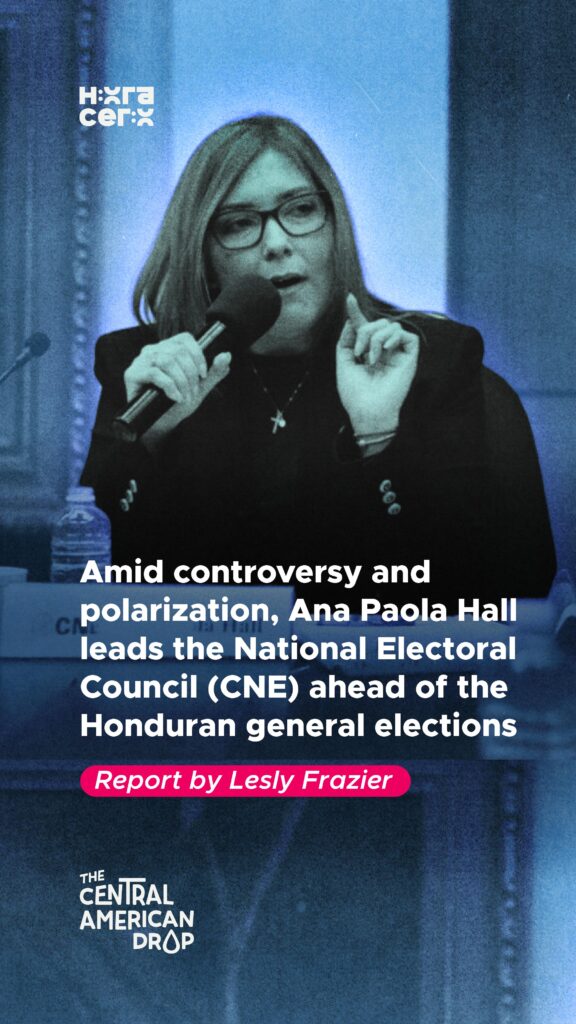
At a crucial moment for the Honduran electoral process, attorney Ana Paola Hall assumed the presidency of the National Electoral Council (CNE) on September 11, less than two months before the general elections scheduled for November 30, 2025. Her appointment comes amid a context marked by public distrust, pending legal proceedings, and a highly polarized political environment.
Hall, who represents the Liberal Party and already has experience presiding over the CNE during the 2021 electoral cycle, assumes leadership of the electoral body at a key stage of the electoral process. Her return has generated diverse reactions: while some sectors value her track record and knowledge of the electoral process, others have doubts about the body’s ability to guarantee transparent elections, especially given the questions raised in previous elections.
Rotation in the presidency of the CNE was established in Article 13 of the Electoral Law, which states that each councilor must serve as president for one year, with no possibility of reappointment until all have served.
Hall assumes leadership following the end of Councilor Cossette López-Osorio’s term. Upon leaving office, she asserted that her administration had laid the legal and operational foundations for the proper conduct of the electoral process. Among the documents pending approval by the plenary session are the regulations for electoral observation, campaign control, electoral propaganda, as well as the guidelines for surveys and opinion polls.
«My commitment to Honduras has just begun. I will stand up for the voice of the people and the right to live in a democracy,» López-Osorio said upon leaving office.
Ana Paola Hall’s arrival at the presidency was also preceded by a significant political episode. Last July, Hall submitted her conditional resignation to the National Congress, denouncing political pressure to accept decisions that, she said, contravened the legality of the entity. The lawyer alleged that she was being forced to accept an irregular composition of the plenary session, with only two councilors, an action she described as unconstitutional. She also reported that she and her family had received death threats.
Ana Paola Hall García holds a PhD in Criminal Law and has a solid track record in the electoral field. In 2019, she was appointed a full councilor representing the Liberal Party. She previously served as president of the National Electoral Council (CNE) from September 2020 to September 2021, during the preparation and conduct of the general elections that defined the current government’s term (2022-2026).
She is also the only one of the three current councilors with direct prior experience in conducting electoral processes, a factor that could work in her favor given the technical and political challenges the body faces.

For Marco Ramiro Lobo, former judge of the defunct Supreme Electoral Tribunal (TSE) and current mayor of Catacamas, the rise of Ana Paola Hall as president of the National Electoral Council (CNE) marks the end of a critical period for the electoral body.
Lobo believes that the fulfillment of the presidential change within the CNE represents an act of respect for the Electoral Law and the Constitution of the Republic, which, according to him, dispels speculation surrounding alleged maneuvers that sought to prevent the representative of the Liberal Party from taking the presidency of the collegiate body.
«Hall’s appointment not only meets the legal framework but also strengthens the institutional framework of the process,» the jurist stated. He also emphasized that Hall’s experience, combined with his technical knowledge of electoral matters, can be a key contribution to the development of democratic and transparent elections on November 30.
However, Lobo emphasized that the responsibility does not fall exclusively on the president of the body, but is shared by all members of the plenary. «Although the presidency performs important functions for compliance with the electoral calendar, ultimately it is the collegiate body as a whole that bears institutional responsibility,» he emphasized.
For his part, electoral advisor Marlon Ochoa, a representative of the Liberty and Refoundation Party (Libre), emphasized that one of the main challenges facing the new CNE president, Ana Paola Hall, will be restoring public confidence in electoral institutions.
In statements to the media, Ochoa stated that the new administration of the body has the responsibility to strengthen the CNE’s credibility with the Honduran population and guarantee a legitimate process. «We will defeat the conspiracies that seek to prevent transparent elections. We will guarantee the people the results they vote for,» the councilor stated.
Meanwhile, the CNE continues to make progress in organizing the electoral process. Among the most recent actions is the approval of the electoral observation regulations, as well as the initiation of the accreditation process for supervisory bodies.
To date, 29 national and international organizations have been officially registered to observe the general elections on November 30th. This measure seeks to strengthen the mechanisms of transparency and legitimacy in the process.
However, sectors involved in social oversight in Honduras have expressed reservations about the impartiality and true capacity of some of the accredited entities. This situation has led to calls for constant vigilance over the role of observers and to ensure that their participation effectively contributes to the transparency of the electoral process.

| Cookie | Duración | Descripción |
|---|---|---|
| cookielawinfo-checkbox-analytics | 11 months | This cookie is set by GDPR Cookie Consent plugin. The cookie is used to store the user consent for the cookies in the category "Analytics". |
| cookielawinfo-checkbox-functional | 11 months | The cookie is set by GDPR cookie consent to record the user consent for the cookies in the category "Functional". |
| cookielawinfo-checkbox-necessary | 11 months | This cookie is set by GDPR Cookie Consent plugin. The cookies is used to store the user consent for the cookies in the category "Necessary". |
| cookielawinfo-checkbox-others | 11 months | This cookie is set by GDPR Cookie Consent plugin. The cookie is used to store the user consent for the cookies in the category "Other. |
| cookielawinfo-checkbox-performance | 11 months | This cookie is set by GDPR Cookie Consent plugin. The cookie is used to store the user consent for the cookies in the category "Performance". |
| viewed_cookie_policy | 11 months | The cookie is set by the GDPR Cookie Consent plugin and is used to store whether or not user has consented to the use of cookies. It does not store any personal data. |